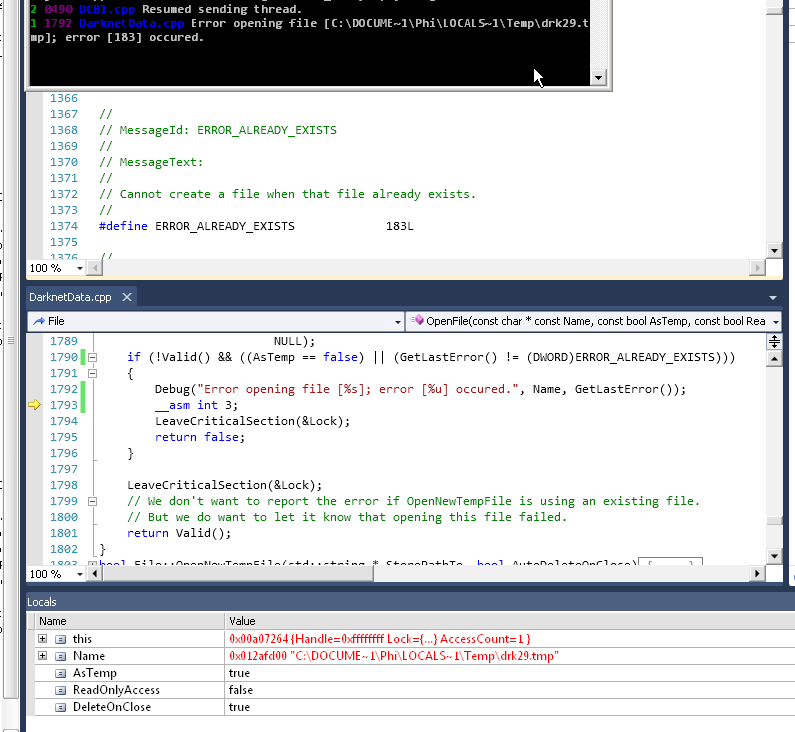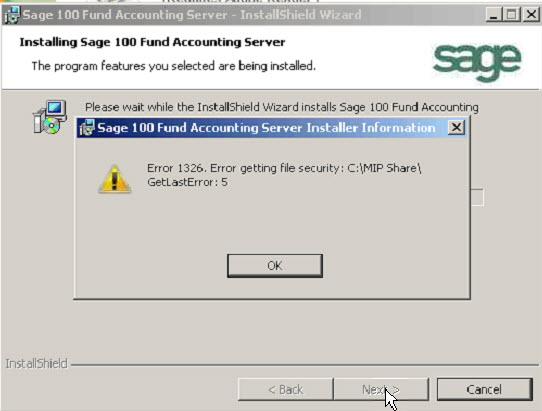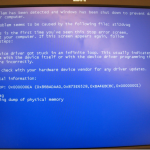In this article, we will describe some of the possible causes that can cause the getlast error, and then describe possible fixes that you can try to fix the problem.
Recommended
g.The GetLastError function returns the last error type for the calling thread. The last error code is counted for each thread. Multiple threads ensure that the last error code of the other does not crash.
g.The application can get all the latest error codes using the GetLastError function; The error code can tell you more about what actually happened when the function failed. The document for system functions specifies certain conditions under which the gift function sets the last error code.
g.
- Read it twice in a few minutes.

Gets the calling thread’s last error code gain. The most recent error code is stored for each thread. Multiple threads agree not to overwrite the last error code of the other.
Syntax
_Post_equals_last_error_ DWORD GetLastError ();
Return Value
A chapter in the documentation on return values that describes the conditions under which a task sets the last error code for any job that sets the last error code. Most of them are effective because the last thread error routine sets them when you fail. However, some functions also set the exact last error code if successful. If our function is not documented fori last specific error code, the value received from this function is just a new last error code that needs to be set; Some functions program the last error code to be 0 when they win, while others do not.
Functions executed when calling a thread determine this evaluation by calling SetLastError function. you have to call the functionGetLastError immediately if the return value of the most recent function indicates that this call is returning useful stuff. This is because some procedures callSetLastError is zero, if successful, clears the set of error codes with the last lost function.
To get a string error for software error codes, use FormatMessage . For a complete list of error mitigation codes provided by the operating system, see System error codes .
The error codes returned by the function do not exactly match the Windows API specification and may vary depending on the operating system or method driver. For this reason, we do not provide a complete list of error codes that These can be returned by each function. There are also some interesting functions, the documentation of which does not even contain an incomplete list of all error codes that can be returned.
The laws of 32-bit errors are values (the 31st bit is also the most significant bit). Bit twenty nine is reserved for application-defined control codes; no system error code set bit of idea. If you understand the error code for your package, set this bit to one. This indicates that this error code was determined by the application, and thus ensures that your error code does not conflict with the system-defined exception error codes.
To convert the system crash to HRESULT gain, useMacro HRESULT_FROM_WIN32 .
Examples
Requirements
| Minimum Client | Windows XP duplicates [desktop applications | UWP Apps] |
| Minimum number of servers | Windows Server 2003 [desktop applications | UWP Apps] |
| Target Platform | Windows |
| Title | errhandlingapi.h (including Windows.h) |
| Library | Kernel32.lib |
| DLL | Kernel32.dll |
See Also
It will be here because I will definitely have to use it later. This is the perfect source for a suitable little binary tool that works equally well in assembly, C, and C ++.

#include / *** * returns 0 if enough space has been taken into account, required payload size in bytes * to correct this result if there is a lack of space. -1 on error. * /__declspec (dllexport)int GetErrorMessageA (DWORD dwErrorCode, LPSTR lpResult, DWORD dwBytes) LPSTR-tmp; DWORD result_len; result_len = FormatMessageA ( FORMAT_MESSAGE_FROM_SYSTEM/ *** * returns 0 if there is enough space, the size of the obstacle in bytes is required * formulate the result if there is not enough space. -1 on error. * /__declspec (dllexport)int GetErrorMessageW (DWORD dwErrorCode, LPWSTR lpResult, DWORD dwBytes) FORMAT_MESSAGE_IGNORE_INSERTS
#ifndef GetErrorMessage_H#define GetErrorMessage_H#include / *** * returns 0 if there is enough space, the size in bytes required for buffering * so that you can correct the result if Food is not enough. -1 on error. * /static int DwErrorCode, geterrormessagea (dword LPSTR lpResult, DWORD dwBytes) FORMAT_MESSAGE_IGNORE_INSERTS/ *** 1. Returns 0 if everything was available, what is the required storage space, the size of the buffer if bytes are required. * to match the final product if there is not enough space. - erase in case of error. * /static int int GetErrorMessageW (DWORD dwErrorCode, LPWSTR lpResult, DWORD dwBytes) LPWSTR-tmp; DWORD symbol; DWORD_result_bytes; nchars = dwBytes >> 1; result_bytes matches 2 * FormatMessageW ( #endif / * GetErrorMessage_H * /
dynamic use-case (assuming the error number is valid, otherwise exploration -1 is required):
#include #include #include #include int main (int argc, char ** argv) int (* GetErrorMessageA) (DWORD, LPSTR, double word); int (* GetErrorMessageW) (DWORD, LPWSTR, double word); because the result is 1 [260]; wchar_t result2 [260]; assert (LoadLibraryA ("GetErrorMessageLib.dll")); GetErrorMessageA = (int (*) (DWORD, LPSTR, DWORD)) GetProcAddress ( GetModuleHandle ("GetErrorMessageLib.dll"), "GetErrorMessageA" ); GetErrorMessageW means (int (*) (DWORD, LPWSTR, DWORD)) GetProcAddress ( GetModuleHandle ("GetErrorMessageLib.dll"), "GetErrorMessageW" ); GetErrorMessageA (33, result1, sizeof (result1)); GetErrorMessageW (33, reresult2, sizeof (result2)); sets (result1); _putws (result2); Returns 0;
normal implementation (assuming the error code is valid, otherwise a -4 check is required):

#include #include "GetErrorMessage.h"#include int main (int argc, char ** argv) because the result is 1 [260]; wchar_t result2 [260]; GetErrorMessageA (33, result1, sizeof (result1)); sets (result1); GetErrorMessageW (33, result2, sizeof (result2)); _putws (result2); Returns 0;
An example of using Gnu through assembly, as in MinGW32 (again forgot that the error code is valid, script validation -1 is required).
Recommended
Is your PC running slow? Do you have problems starting up Windows? Don't despair! Fortect is the solution for you. This powerful and easy-to-use tool will diagnose and repair your PC, increasing system performance, optimizing memory, and improving security in the process. So don't wait - download Fortect today!

.global _WinMain @ 16 .Text section_WinMain @ 16: // eax = LoadLibraryA ("GetErrorMessageLib.dll") let $ sz0 _LoadLibraryA @ 4 Contact // stdcall, no cleanup required // eax matches GetProcAddress (eax, "GetErrorMessageW") Travel $ sz1 prod% eax call _GetProcAddress @ 8 // stdcall, no cleanup required // (* eax) (error code, szErrorMessage) press $ 200 even press $ szErrorMessage even press the error code Conversation *% eax // cdecl, cleanup required add 12,% esp push $ szErrorMessage call __putws // cdecl, cleanup required pocket 4,% esp returned $16 .Rodata sectionsz0: .asciz "GetErrorMessageLib.dll"sz1: .asciz "GetErrorMessageW"Error code: .long 33 .Data sectionszErrorMessage: .space 200
Result: The policy cannot access the file because an additional process has blocked the portion associated with the file.
Speed up your PC today with this easy-to-use download.
What is WriteProcessMemory?
WriteProcessMemory copies data from the specified buffer in a specific running process into the address space of the specified process. Any process that creates a handle with PROCESS_VM_WRITE and PROCESS_VM_OPERATION approvals for a process to be written can call the function.
What is SetLastError?
Most functions call SetLastError or SetLastErrorEx only on error. If desired, applications can get the value specified by a function of this type by using the GetLastError function immediately after the function fails.
How do I find Windows error codes?
Use the Microsoft troubleshooter.Install Windows Debugging Tools, download a reliable dump file, and run it! err command.Find the plain text and error code on the Microsoft protocols site. For more information see [MS-ERREF]: Wind Error Codesows.
Getlast Fehler
Oshibka Getlast
Getlaatste Fout
Pobierz Ostatni Blad
Erro Getlast
Getultimo Errore
Getlast Fel
Obtenir La Derniere Erreur
마지막 오류
Obtener El Ultimo Error




